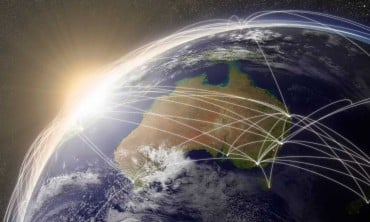Blockchain not the best technology for every considered use, says Australian government report.
2 min read

What a change!
In May, Australia’s Department of Home Affairs revealed a plan to investigate blockchain’s potential to bring secure and transparent international trade and supply chain management.
The chief digital officer of Digital Transformation Agency (DTA), Peter Alexander said: “Blockchain: Interesting technology but early on in its development, it’s kind of at the top of a hype cycle.” Alexander said at a parliamentary committee meeting on Tuesday, as reported by ZDNet.
He was further quoted as saying that most of the hype comes from companies seeking to make profits in this area.
“It’s not that we don’t trust any of the vendors – that would be an unfair characterization – we trust the vendors, but note that the motivation is general sales and making revenue.”
He said standardization of blockchain might open up more opportunities for its use in providing government services.
“We’re not saying that blockchain doesn’t have potential but today, without standardization, there is the challenge of blockchain becoming a little fragmented. When we get to the standardized blockchain then the opportunities for it will grow.”
There is better technology?
Alexander continued, saying that, “for every use of blockchain you would consider today, there is a better technology.”
According to InnovationAus.com. Alexander said that one of the defining features of the blockchain, the potential for anonymity, is among the biggest stumbling blocks.
“Generally speaking when the government is engaging with someone, we want to have a trusted relationship with them. We want to know who they are and give them a personalized service,” he said. “Blockchain is good for low-trust engagement. You don’t know who you’re dealing with but have a series of ledgers that can give some validation and support.”
Peter Alexander, the CDO at DTA said the technology is worth keeping an eye on but is not yet mature enough.
According to Alexander, blockchain is at the “top of the hype cycle”, with demand driven by the industry.
“It would be fair to say that a lot of the big vendors are pushing blockchain very hard. And internationally most of the hype around blockchain is coming from vendors and companies. Not from governments and users and deliverers of services,” he said.
Interesting timing
It is indicated to this opinion was arrived at after the Australian government’s Digital Transformation Agency (DTA) received AU$700,000 (about US$500,000) from the government in May. That amount came to explore blockchain applications within government services.
The Australian government’s DTA has cast doubts over the validity of blockchains for governmental purposes. The agency has been working with a number of government agencies. They wanted to develop prototypes for the use of blockchain to deliver services. Including with the Department of Human Services for welfare payments and cargo settlement.
On the other side is Australia’s new prime minister, Scott Morrison. He is a fan of fintech, open banking and technologies such as blockchain that will drive Australia’s future.
As treasurer, Morrison urged attendees at the Australian Fintech Awards in early August 2018. He wanted to take advantage of the disruption wave sweeping through the global economy.
“I am frankly counting on you not to stuff this up. You need to make this work…In today’s global economy, the ability for economies to become more productive is not being done the old way: the biggest transformer of productivity [will be] innovation,” he told attendees at the awards, as reported by the Australian Financial Review.
Unfortunately, Australia is not an isolated case.
China is another nation that finds blockchain’s anonymity a problem. Earlier this year Chinese students encoded allegations of sexual harassment against a prominent professor on the Ethereum blockchain. They wanted to evade the country’s censors. All social media posts on the issue having been blocked. The same technique was used to spread the news about low quality and counterfeit vaccines, another scandal the government sought to cover up.
China banned crypto
But the Chinese government has drafted a new regulation. That ordinance would require users to provide their real names and national ID card numbers when registering for a blockchain service. The policy would also demand that blockchain services remove ‘illegal information’. And before it can be spread among users. Also under the proposed legislation. Service providers would also have obligation to retain backups of user data for six months. Of course, and to hand it over to the police on request.
China also banned cryptocurrency trading earlier this year, although. Apparently, this has been less than effective. The Ethereum Hotel recently opened in the country, accepting payment in cryptocurrencies.
One note to remember. Without the possibility of anonymity, a permanent ledger could also be a powerful tool in the authoritarian regime’s surveillance and control systems.

Unlike Australia and China, UK leads the way in blockchain deployments for the supply chain.
There is some survey conducted by consultancy Capgemini. They researched 450 organizations implementing blockchain in their supply chain. And the result wasn’t surprising. Only three percent so far took initial experiments into production at scale. Well, the adoption and the technology itself are at an early stage. The Capgemini report identifies a number of current use cases. They are in the range from low complexity/high adoption scenarios. Like the prevention of counterfeits and tracking asset maintenance, for instance. But also more ambitious and complex uses. Like customer loyalty programs, contract labor procurement, and regulatory compliance, for example.
United Kingdom example
The UK currently leads the way with production and pilot implementations of blockchain projects in the supply chain. At the same time, the USA leads in terms of funding blockchain initiatives.
In the UK specifically, the consumer products vertical is the biggest adopter among those surveyed. It is followed by manufacturing and then retail. However, globally manufacturing is in the leads in adopting this technology.
Capgemini has been working with blockchain technology since 2016. Then it began developing solutions for the financial services industry. The report predicts that experimenting with blockchain will peak in 2020. But it will enter mainstream supply chain usage by 2025.
While throughout the history there were numerous cases of unfounded fears of new technology. For many potential uses, the blockchain is not mature enough. Or lacks the functionality. Or there is the issue of the anonymity of users.
On the other hand, this anonymity could inhibit the nefarious motives and actions of less savory governments against their own citizens.
We will see in which direction the further development of blockchain will go. There is one solid fact: blockchain will survive.
Risk Disclosure (read carefully!)



Leave a Reply